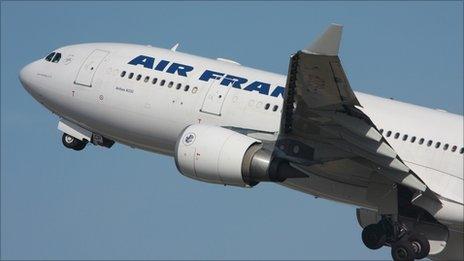Air France crash 'due to pilot and technical failings'
- Published
Author M R Hall said the pilots "did not know if they were climbing or descending"
A combination of technical failure and human error led to the loss of an Air France flight over the Atlantic in June 2009 and 228 deaths, according to the final report into the crash.
The report by the French aviation authority highlights faults with the Airbus A330's air-speed sensors which confused the pilots.
But it also points to inappropriate action by them.
The jet disappeared in a storm while flying to Paris from Rio de Janeiro.
'Total loss of control'
The BEA aviation authority said that the disaster began with the malfunctioning of speed sensors known as Pitots during a period of heavy turbulence.
The captain was taking a rest break and the co-pilots were in control at the time. The captain returned to the flight deck but was unable to reverse the catastrophic course of events which saw the plane stall and plunge into the sea.
One of the mistakes of the crew was to point the nose of the aircraft upwards after it stalled, instead of down.
"The crew was in a state of almost total loss of control of the situation," BEA chief investigator Alain Bouillard told journalists on Thursday at the release of the final report.
They never understood that the plane was in a stall as it descended at 11,000ft (3,352m) per minute, he added.
And BEA director Jean-Paul Troadec said: "This accident results from an aeroplane being taken out of its normal operating environment by a crew that had not understood the situation."
The report makes 25 new safety recommendations on top of the 25 called for in a preliminary report last year.
In 2012 investigator-in-charge Alain Bouillard told reporters: ''The crew had almost lost complete control of the situation''
These include better pilot training and improvements to plane warning systems.
"If the BEA thought that this accident was only down to the crew, we would not have made recommendations about the systems, the training... which means that this accident could no doubt have happened to other crews," Mr Troadec added.
In response, Airbus said in a statement that it would "take all measures to contribute to this collective effort towards optimising air safety".
Air France defended its pilots, saying they had responded to confused and conflicting information, including multiple warnings and alarms, aerodynamic noises and vibrations.
"In this degraded environment, the crew, combining the competence of the captain and two co-pilots, remained fully engaged in flying the plane until the last moments," the airline said.
Relatives of some victims say they view the report as more impartial than earlier conclusions that blamed the pilots alone.
Manslaughter claims
Both Air France and Airbus are under investigation by French magistrates for alleged manslaughter.
A separate judicial report will be released next week. This is also expected to echo Thursday's report by the BEA, the French news agency AFP says.
Since the crash, Air France has replaced the speed sensors on its fleet of Airbus jets - made by the French firm Thales - with a newer model.
The wreckage of the plane was discovered after a long search of 10,000 sq km (3,860 sq miles) of sea floor.
After 23 months of searching, robot submarines finally found the flight "black box" recorders last year.
- Published29 July 2011

- Published5 April 2011
- Published7 April 2011
- Published18 March 2011